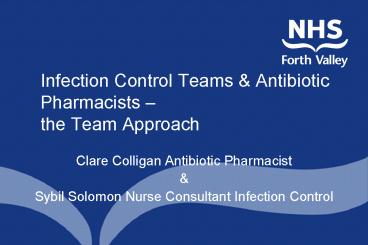Infection Control Teams - PowerPoint PPT Presentation
1 / 19
Title:
Infection Control Teams
Description:
Other involvements member of SIGN review team for antibiotic prophylaxis ... Reduce venflon associated infections. MRSA eradication pharmacists review kardexes ... – PowerPoint PPT presentation
Number of Views:60
Avg rating:3.0/5.0
Title: Infection Control Teams
1
Infection Control Teams Antibiotic Pharmacists
the Team Approach
- Clare Colligan Antibiotic Pharmacist
- Sybil Solomon Nurse Consultant Infection Control
2
(No Transcript)
3
Overview of the role of Nurse Consultant
Infection Prevention and Control
- Multi faceted
- To provide leadership and supervision to
infection control service delivery area wide on
prevention and control of infection including
independent contractors to ensure compliance with
national initiatives, guidance and standards
working with a range of staff cross the board
i.e. strategically and operationally - Responsibilities in a wide ranging portfolio
which reflects the HAI Task Force Action Plan and
local Infection Control Programme based on
clinical/expert practice, education and training,
professional leadership and consultancy, research
to improve the quality of patient care through
audit and evaluation of practice and working in
collaboration with clinical teams - Other involvements member of SIGN review team
for antibiotic prophylaxis guideline, member of
SAPG, co-author for NES module colonisation v.
infection
4
Antimicrobial Stewardship what that means for
the Infection Control Team? (1)
- The action of prescribing an antibiotic is the
end point of a process in making a decision to
treat based on clinical findings e.g. signs and
symptoms, patient examination, microbiological
sampling supported by documented evidence. Its
the elements of the decision making process that
infection control teams can be proactive with.
5
Antimicrobial Stewardship what that means for
the Infection Control Team? (2)
- Based on a small study in 6 primary care of
elderly wards (111 prescriptions for 90 patients)
to investigate compliance with antibiotic
prescribing guidelines for the three commonest
infections i.e. UTI, RTI, S/STI, the following
were identified - Incidence of antibiotic prescribing 43
- Prevalence of antibiotic prescribing 17
- Patient examination 40
- Annotation of SS 65
- Microbiological samples obtained 35 of which 59
positive distinction between colonisation and
infection not made - Clinical indication for therapy recorded in
patient notes 85 - Where therapy met guidelines administration often
exceeded it.
6
Antimicrobial Stewardship what that means for
the Infection Control Team? (3)
- Its in the context of these findings that the
infection control team can lead - Antimicrobial prescribing -
- Raise awareness of implications to the patient
and professional accountability - Ensure that SS, patient examination and
microbiological sampling are undertaken and
recorded if it isnt recorded then it didnt
happen - Provide education on the difference between
colonisation and infection - Ensure accurate giving of information - consider
utilisation of SBAR methodology to standardise - Surveillance
- Share data collected for CDAD, SABs etc.
7
Antimicrobial Stewardship What that means for
the Antibiotic Pharmacist
- Antibiotic guidelines
- Limit misuse of antibiotics
- Indication
- Correct drug, route, dose
- Monitoring
- Consumption data
- Audit
8
How the Antibiotic Pharmacist and the Infection
Control Team started to work together!
- Review of structure and membership of AMG
- ScotMARAP action plan
- Links to surveillance results e.g. CDAD and SABs
- Results of NCIC dissertation study shared with AP
and AMG - Proposal to meet the requirements of ScotMARAP
(2008), NHS Forth Valley Antimicrobial Management
Group Action Plan, CEL 11 (2009) A Revised
Framework for National Surveillance of HAI and
HEAT target for CDAD, national study (ESAC) of
antimicrobial prescribing (2009).
9
Working together primary care (1)
- ESAC audit
- NCIC and PC Antibiotic Pharmacist to work with
physicians and GPs to develop awareness around
common infections and develop awareness of CDAD
in primary care - Joint study day for Charge Nurses on CDAD and
antimicrobial management and infection control
measures to minimise cross infection - NCIC and PC Antibiotic Pharmacist to work with
nursing staff around ensuring appropriateness of
antibiotic prescribing based on algorithms
produced for commonest infections
10
ALGORITHM FOR PRESCRIBING ANTIBIOTICS IN URINARY
TRACT INFECTIONS IN THE ELDERLY (adapted from
Loeb et al, 2001)
11
Working together - primary Care (2)
- CREATE sessions for GPs infection control /
antibiotic prescribing - CDAD
- Cause
- Management
- Antibiotic prescribing
- Enhanced service
12
Working together acute care(1)
- Sharing information
- Infection control surveillance data collected by
surveillance nurse for CDAD, SABs - Infection control routine surveillance of all
positive microbiological results - Antibiotic Pharmacist input to data collection
forms for CDAD - Using infection control surveillance data the
Antibiotic Pharmacist can identify which
antibiotics patients are prescribed in relation
to CDAD and SABs reports sent regularly - Antibiotic Pharmacist surveillance data on
antibiotic use can assist the infection control
team in identifying prescribing issues from an
antibiotic utilisation report if there is a
perceived problem identified through routine ward
visits, increased numbers of cases etc.
13
(No Transcript)
14
Acute Care
15
Working together (3)
- CDAD Policy and ICP
- Review of CDAD cases multi disciplinary
including clinician, ICT, microbiologist,
Antibiotic Pharmacist
16
Working Together - MRSA/ MSSA SABs
- Appropriate antibiotic use
- Peripheral venous catheter care bundles
- Timely IV to oral switch
- Reduce venflon associated infections
- MRSA eradication pharmacists review kardexes
17
The Future (1)
- Utilise all the data that is collated
- Reduce duplication
- Enhance the monitoring already in place
- Infection control surveillance data collected by
SSI officer for SSI - C section, abdo hysterectomy, hips, knees,
long bones) SSI surgical antibiotic
prophylaxis - SPSP surgical prophylaxis data
18
The Future (2)
- MDT events
- Spread the message prevent infection, reduce
antimicrobial use - Develop decision support models for common
infections and implement in LTC facilities
19
(No Transcript)






![[PDF] Infection Control and Management of Hazardous Materials for the Dental Team, 6e 6th Edition Kindle PowerPoint PPT Presentation](https://s3.amazonaws.com/images.powershow.com/10077071.th0.jpg?_=20240711012)
























